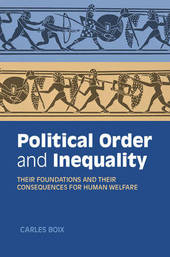
|
Political Order and Inequality: Their Foundations and their Consequences for Human Welfare
Paperback / softback
Main Details
| Title |
Political Order and Inequality: Their Foundations and their Consequences for Human Welfare
|
| Authors and Contributors |
By (author) Carles Boix
|
| Series | Cambridge Studies in Comparative Politics |
|---|
| Physical Properties |
| Format:Paperback / softback | | Pages:334 | | Dimensions(mm): Height 229,Width 151 |
|
| ISBN/Barcode |
9781107461079
|
| Classifications | Dewey:320.1 |
|---|
| Audience | | Tertiary Education (US: College) | | Professional & Vocational | |
|---|
| Illustrations |
24 Tables, unspecified; 2 Maps; 50 Line drawings, unspecified
|
|
Publishing Details |
| Publisher |
Cambridge University Press
|
| Imprint |
Cambridge University Press
|
| Publication Date |
16 February 2015 |
| Publication Country |
United Kingdom
|
Description
The fundamental question of political theory, one that precedes all other questions about the nature of political life, is why there is a state at all. Is human cooperation feasible without a political authority enforcing it? Or do we need a state to live together? This problem then opens up two further questions. If a state is necessary to establish order, how does it come into place? And, when it does, what are the consequences for the political status and economic welfare of its citizens? Combining ethnographical material, historical cases, and statistical analysis, this book describes the foundations of stateless societies, why and how states emerge, and the basis of political obligation. As a result of this inquiry, it explains the economic and political roots of inequality, describes the causes of the stagnation of the preindustrial world, and explores what led to the West's prosperity of the past two centuries.
Author Biography
Carles Boix is the Robert Garrett Professor of Politics and Public Affairs in the Department of Politics and at the Woodrow Wilson School of Public and International Affairs at Princeton University. His first book, Political Parties, Growth and Equality (Cambridge, 1998), examines the different means through which partisan governments manage the economy in a globalized world. In his more recent work, Democracy and Redistribution (Cambridge, 2003), Boix describes the economic and institutional conditions that lead to democratization. Both books received the William Riker award for the best book on political economy. Boix coedited the Oxford Handbook of Comparative Politics (2007), which has quickly become one of the main works of reference in political science, and has published in the top journals of the discipline, such as the American Political Science Review and World Politics. He is a Guggenheim Fellow and a member of the American Academy of Arts and Sciences.
Reviews'With analytical clarity and fresh data, Carles Boix has produced a work that cannot be ignored by scholars interested in the biggest questions about politics, economics and society. What kinds of regimes generate the strongest economies? Where do these regimes come from? What is the relationship among politics, growth and inequality? Boix does not offer sound bite answers. Deeply historical, this book provides a multi-layered, interdisciplinary analysis of how we got where we are today and what our prospects are for the future.' Frances Rosenbluth, Damon Wells Professor of Political Science, Yale University, Connecticut 'Charles Tilly famously said that 'war makes the state and the state makes war'. In this impressive new volume, Carles Boix argues, with ingenious tests, extensive data and methodological rigor, that, indeed, 'it was inequality and war, rather than the logic of efficiency gains, that made the state'. Political Order and Inequality is a major contribution to our understanding of state formation and the origins of inequality.' Robert O. Keohane, Woodrow Wilson School of Public and International Affairs, Princeton University, New Jersey 'Deploying cutting-edge analytic rigor, deep historical insight and sound quantitative evidence, Carles Boix has produced a wonderfully engaging book. The book reveals how inequality is the price we pay for our economic well-being and that material wealth is inextricably linked to the origin of the state. Specific forms of political obligation are shaped by how societies balance the tension produced by shifts in military technology and how they are harnessed by political organizations. Boix is equally deft at discussing the Neolithic revolution, the measurement of inequality through skeletal records, or the development of European cities. Political Order and Inequality should be required reading for anyone interested in the political economy of development.' Alberto Diaz-Cayeros, Stanford University, California
|